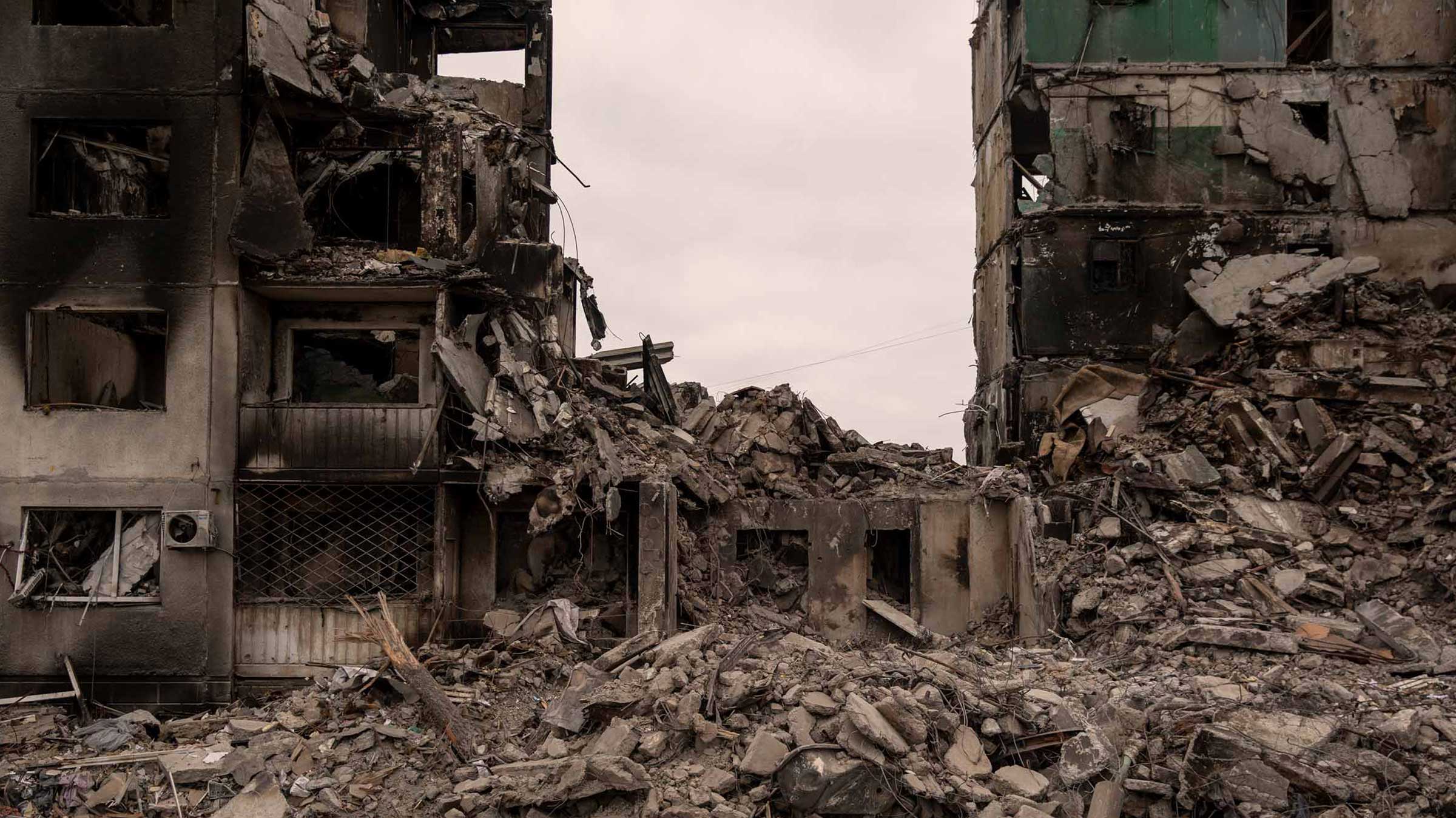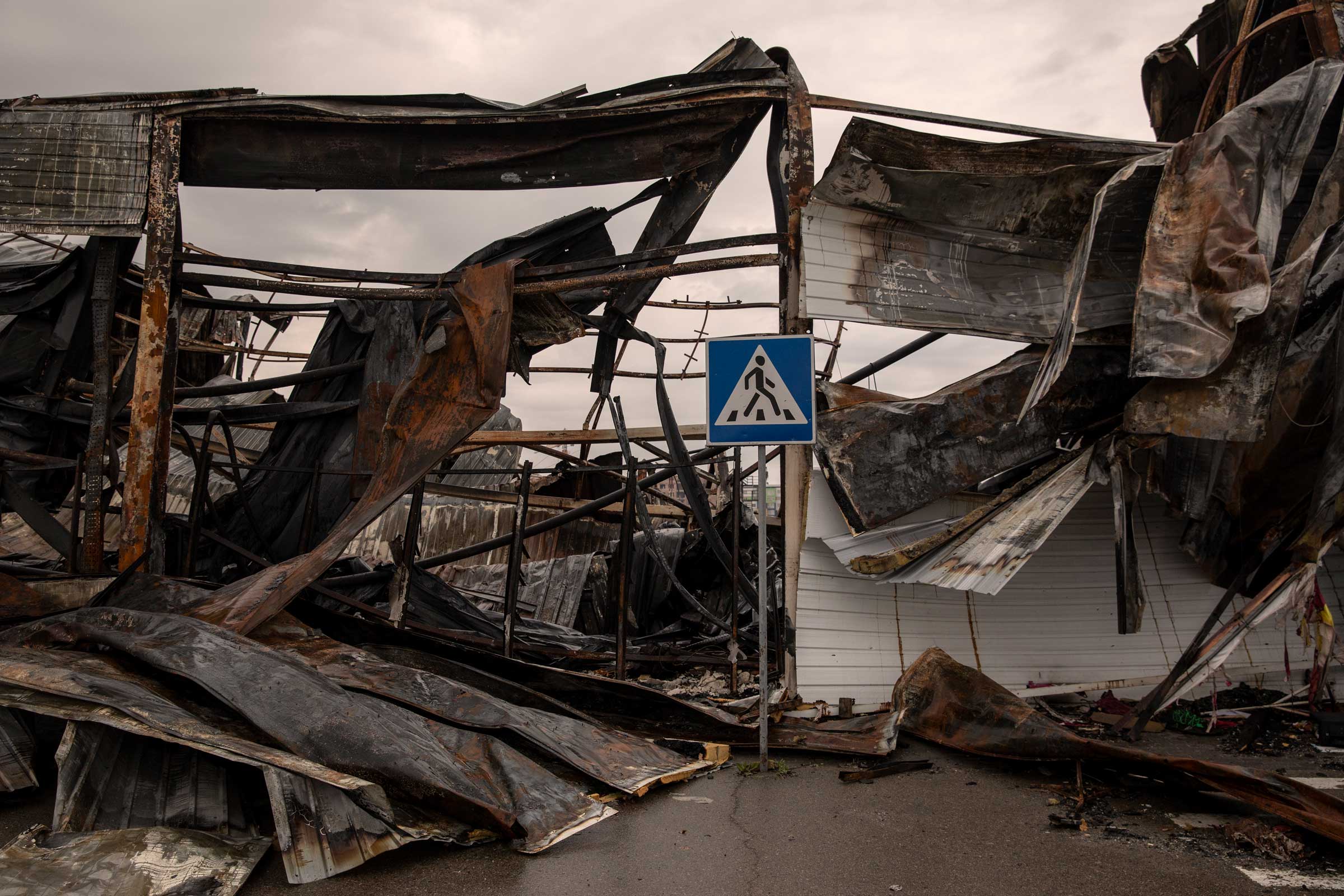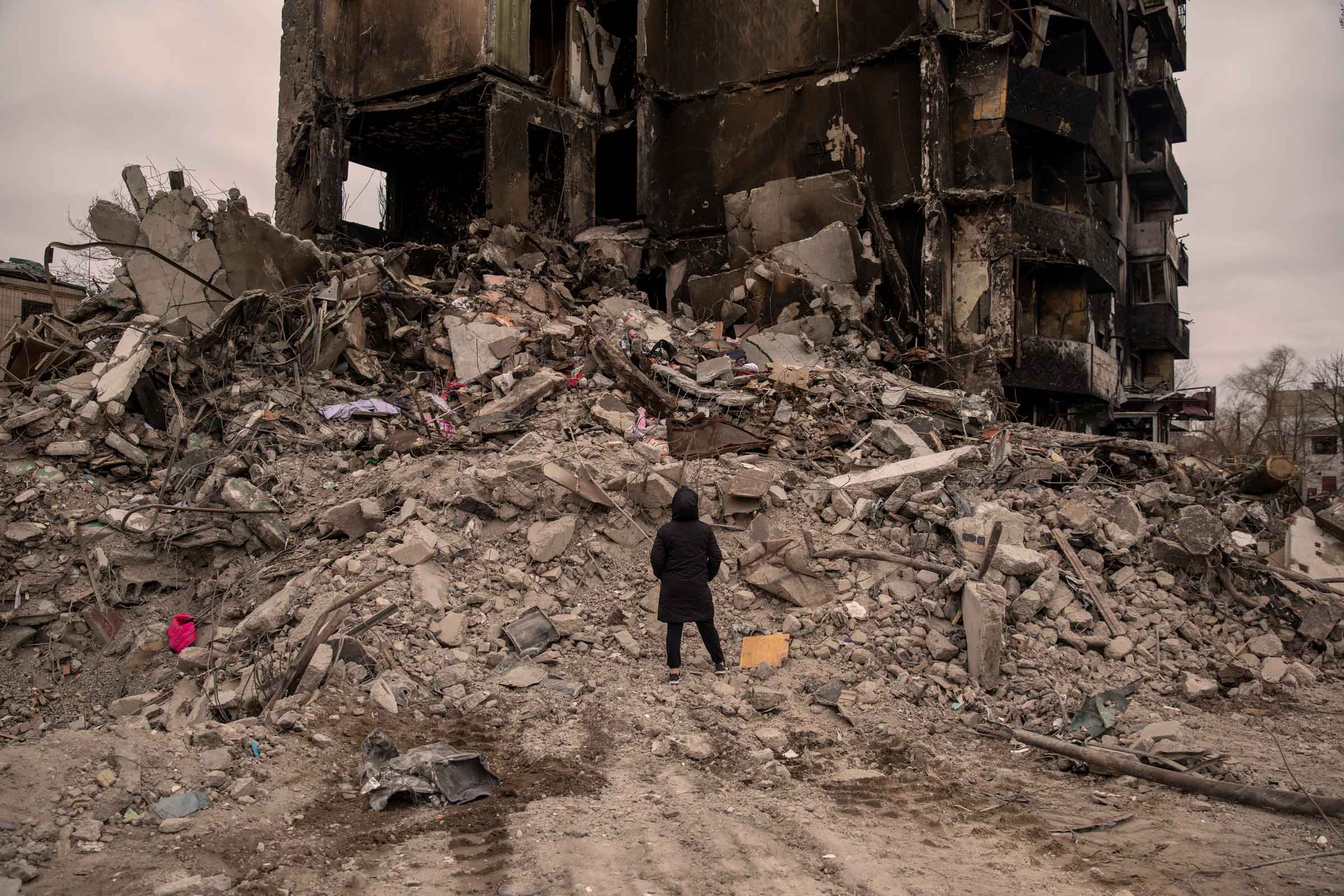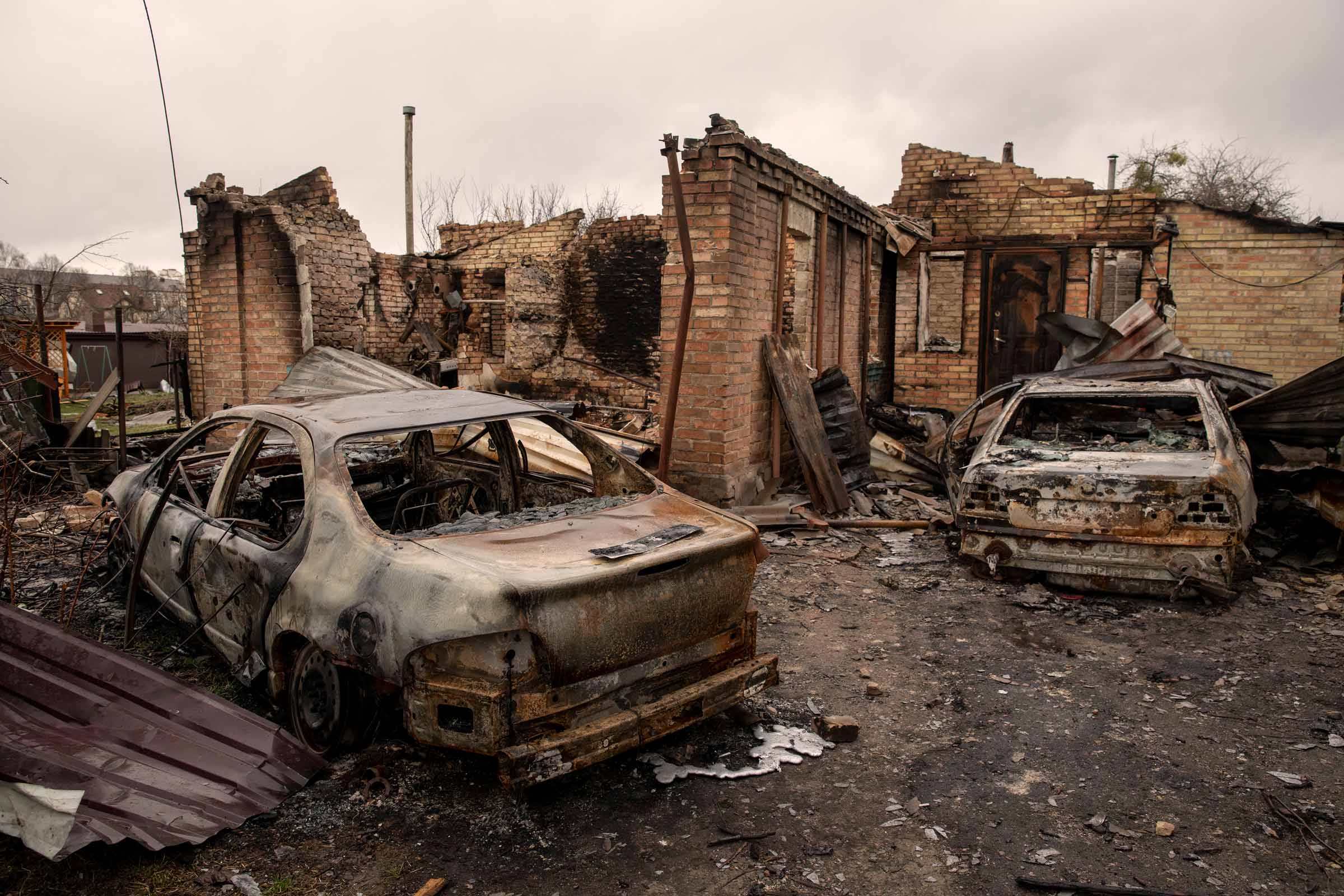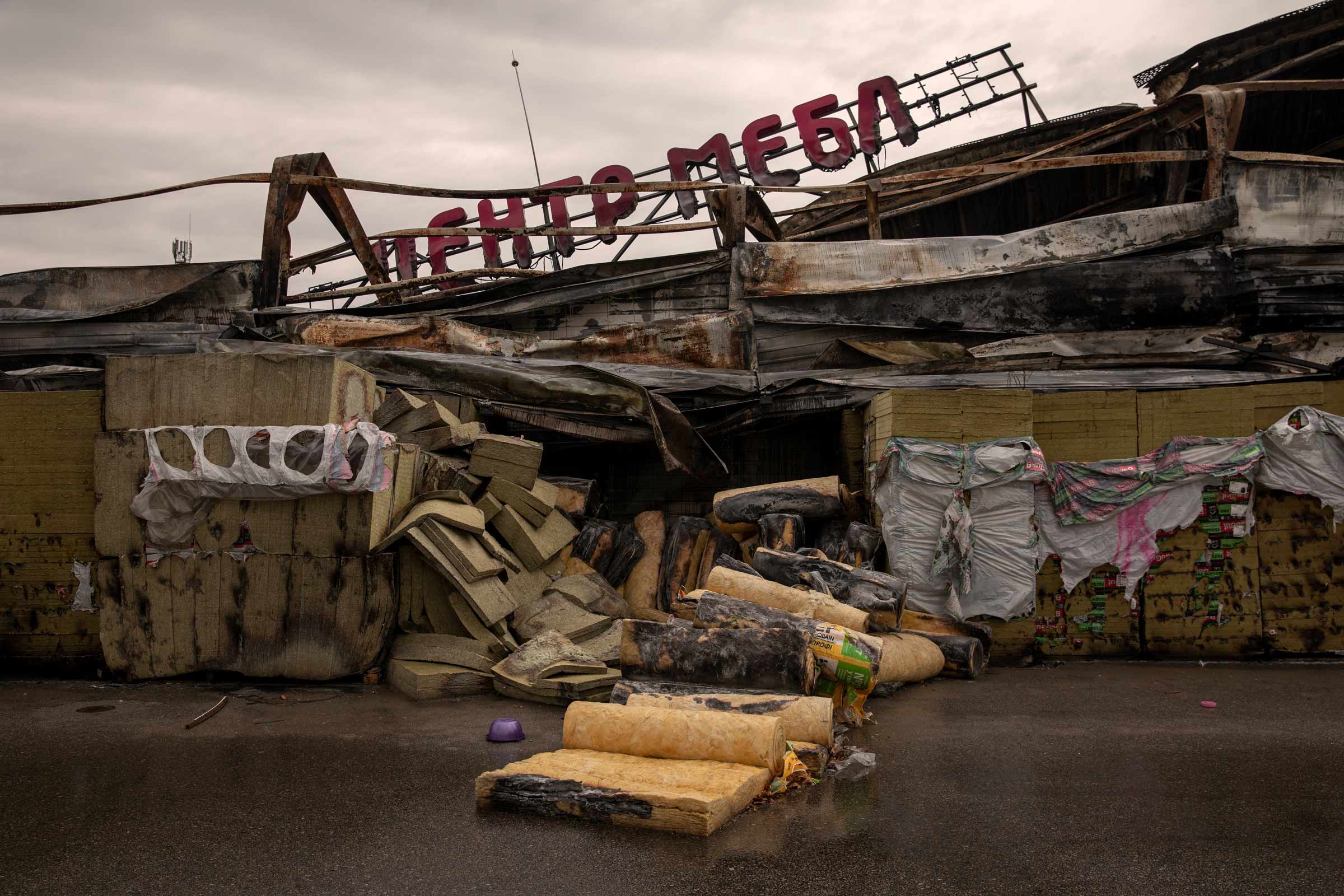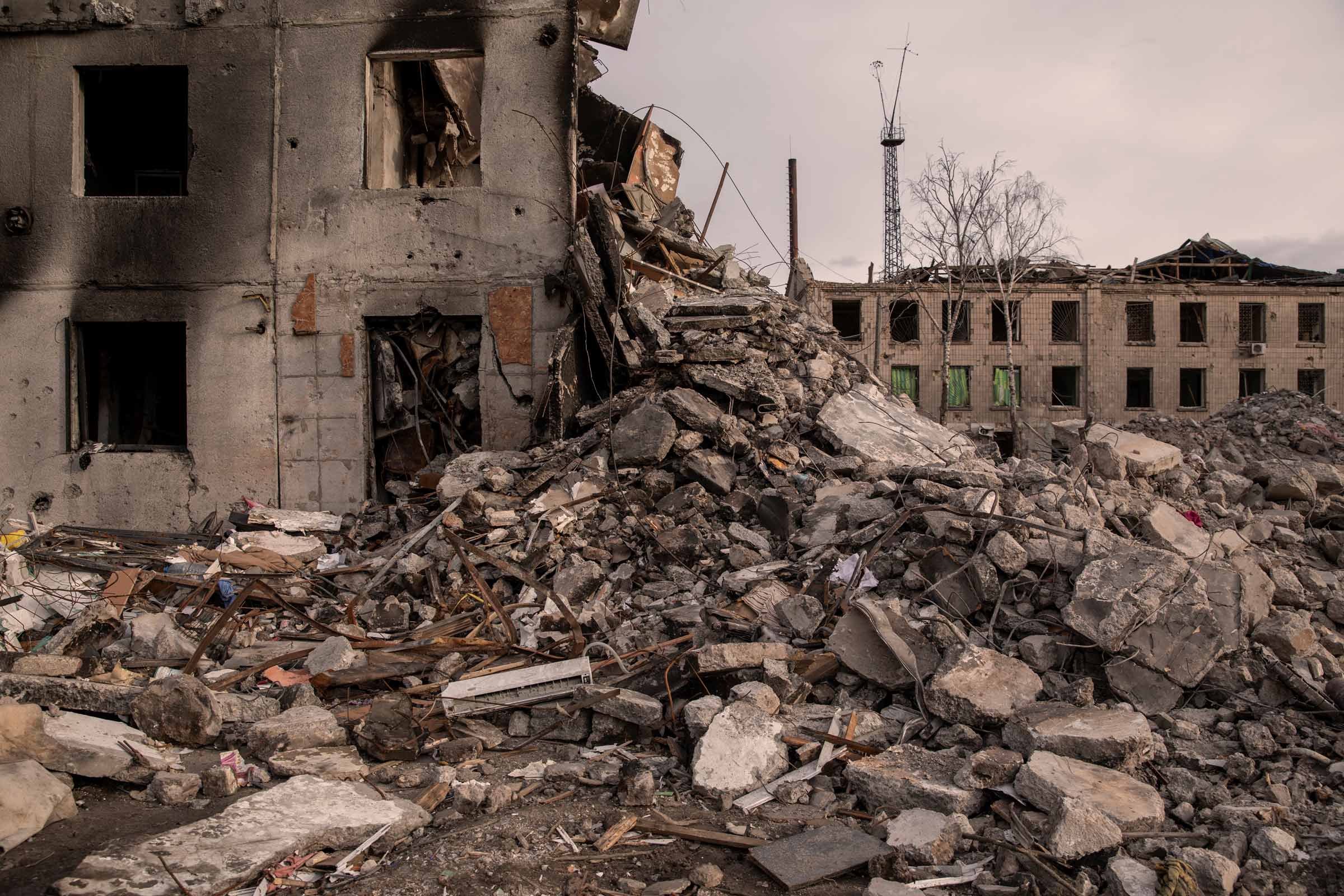“In a time of war, beauty becomes dangerous. Beautiful things, people, relationships—nowadays they don’t exist to inspire. They exist to be annihilated.”
“I’m not a journalist, I’m a listener,” Ostap Slyvynsky, writer and translator, told me one afternoon while we sat in Black Honey, a small café near Lviv’s city center. It was a pale, late winter afternoon, and Ostap was recounting some of the stories he’d gathered from the Ukrainians displaced by war. Short, fragmentary stories of loss and trauma, and the cruel and wanton depredations of war. When the war began, and trains started unloading their disoriented human cargo at Lviv station, Ostap was there to help, but also to listen. Later, he would write down the stories he’d heard, often just a few sentences, some with a bitter sting in the tail, some mere absurdities magnified by war, like the description of the promotional billboard for affordable housing that now stands in front of a bombsite. As we talked, we drank coffee, which is all anyone can do in Lviv these days. You talk, you drink coffee, you move on to the next café. There is an inordinate number of them. “That’s why we’re winning,” Ostap laughed, when I told him I’d never seen people drink so much coffee as in Lviv. We were a month into the war, and that kind of confidence—that the war was going in Ukraine’s favor—was still a novel feeling. On February 24, as the tanks rumbled over the border and shells began exploding over Kyiv, there had been a sense that, once again, the Russian war machine would be unstoppable, as it had proved in the 20th century—crushing popular uprisings in Hungary in 1956, in Czechoslovakia in 1968, and in Poland in 1956, 1968, and 1970. But now that the Russians seemed to be struggling, there was a mood of uplift in the air. Yet life was far from normal, as the stories Ostap has gathered reflect. They were a reminder that if the city felt busy, even lively, it was in large part because 200,000 displaced people were now living there, each with war stories of their own.
…
In 1943, while living in Nazi-occupied Warsaw, Czesław Miłosz, a Polish poet, wrote The World: A Naïve Poem. Most pieces in the collection serve as explanations of simple words, such as “Anxiety,” “Love,” “Hope,” “Gate,” “Porch,” and “Road”—because war changes the meaning of words. Some are blunted and need sharpening, as a knife against a stone. Some become so sharp you cannot look at them. Some words just die and fall off. Some emerge from the past, and start to be meaningful again. They gain importance.
I will try to compile such a war vocabulary. But these will not be poems or any kind of literary works written by me. All are fragments of monologues, stories of others that I have been listening to during these grim days. Well, some of them may be “literarized.” Some of them are also translated from Russian.
People tell their stories at the Lviv railway station (where waves of internally displaced persons are rolling in from East to West), at temporary shelters, or in the street, near coffee stands. Some of them are eager to share, and some of them are asked gently first, and then they break out like an unstoppable wave.
I did not record all of the stories myself, though. Some of them were recorded by co-authors—Anna Protsuk, Yevhen Klimakin, Oksana Kurylo, and Dmytro Tkachuk—and some of them by participants in and witnesses of this war. These are both their private stories, and stories they have heard from others.
APPLES, Anna, Kyiv
That night I fell asleep in the bathtub, in a bucket of blankets and pillows, listening to the most powerful explosions here since the beginning of the war. Long ago, in a past life, I was crazy in love, and we went to a house in the Carpathian Mountains. It was deep in autumn. We fell asleep in an attic—in a bed that was not much more comfortable than the bathtub—and I listened to apples hitting the ground everywhere in the garden. The slamming of the large, ripe apples continued at a measured pace throughout the night. I was happy.
Now, I fall asleep to the explosions and I hear those apples. I so badly want it to be those garden apples hitting the ground around us.
BATH, Maryna, Kharkiv
We did not have a shelter close to us, so the bathroom was our best hope. I never thought that our whole apartment could shrink to the size of the bathroom. When the missiles started flying around us—first, several houses away from ours, and then just two—I gradually stopped tidying up the apartment and wiping the dust, as though giving up on it all. It seemed so pointless to me. And then I told my bathtub, “Let’s hope you save me, okay?”
When a missile hit our yard, I was in the bathtub. Every single window was blown out, together with the frames. The kitchen, the bedroom—the whole floor was covered in glass. I could never have survived anywhere else. Only in the bathroom. And guess what? Hot water came in the next day. I don’t know why, but it felt like an award for something. No lights, but hot water pouring from the tap! I filled the bathtub with it, and lit some candles. I found some aromatic oil somewhere. I felt like the character in One Thousand and One Nights, like Scheherazade. Only I don’t count nights anymore.
BEAR, Anonymous
My sleep is more real than my day. During the day, I chase those thoughts in my head away by daily errands. But in my sleep, reality strikes back. The Sleep of Reason Produces Monsters, Goya said. One of many meanings of such words now is that you’ve got to make yourself think against reality. Today, I wanted to go back to my childhood. So I “escaped” to where there is no war. To Makiyivka, to Ust-Kamenogorsk, to the Zakarpattya of my childhood. The first time, I remembered growing up as a preschool kid step by step. And now I remember the bear. Both my own bear, and another one—an imagined one. Two teddy bears. And either I am hugging his little self or he, enormous and white in spots, is hugging me. I am fantasizing, and there is no war. Let me say it aloud: “fantasy.” This word does sound wonderful, “fantasy.”
“In a time of war, beauty becomes dangerous. Beautiful things, people, relationships—nowadays they don’t exist to inspire. They exist to be annihilated.”
BEAUTY, Kateryna, Vyshhorod
I read a story about WWII not so long ago. There was this girl who wore her mom’s worst clothes to pass by the Nazis unnoticed, to avoid being raped. I pause near my wardrobe; is it time to wear the worst already, or can I still make it? Things change so quickly. The cabs are not coming. Either the line is busy or they refuse. I will just walk to Kyiv.
In a time of war, beauty becomes dangerous. Beautiful things, people, relationships—nowadays they don’t exist to inspire. They exist to be annihilated. Not for admiration and loving touches, but for pain.
My boots get stuck in the mud along the highway. My phone beeps with an SMS: “You have just visited our beauty parlor for a manicure. Please, leave a review.”
BULLET, Mykola, Khmelnytskyi
I don’t know if I took a sin upon my soul. I just aim, and I fire, but I close my eyes while firing. Whether my bullet kills someone or not, one can only guess.
CANARY, Olya, Irpin
When we were fleeing Irpin, there was this moment when it went so quiet. A house stood nearby that was hit by missiles. All the windows were broken, the entrance was blocked. And it was at that moment that I heard a canary through one of the windows. I used to have a canary when I was a kid, so I always recognize that sound. It must have gone down to a bomb shelter and did not have a chance to come back up. So much happened before and after that, but I cannot forget that canary.
CAVE, Roman, Chernihiv
My whole life, I was into speleology. When I had a free weekend, I would pack my gear and go exploring caves. There is a large bomb shelter in our neighborhood, under a school. For the first couple of days, there was no light there. I came in wearing a headlamp; it was quiet inside. It seemed that there was no one there. And suddenly, I saw people. I saw children crammed in by the walls. All those people were like stalagmites and stalactites. It seemed as though they had been there for thousands of years. That’s what war does to time.
COCOA, Bohdana, Lviv
Yesterday there were a lot of people from Kramatorsk, a whole bunch of them. The trains kept coming, and so would the people, for some food and conversation. At the time, we were serving rice porridge with milk, a typical morning meal, and one I didn’t like. We were running out of coffee, and we thought we’d start making cocoa. Grown-ups like drinking cocoa—they are just too ashamed to acknowledge it. I was looking for green tea among the packs of black. I made jokes that we could feed half of Ukraine with Polish tuna because our storage room was so full of it. In it, we found half-liter water bottles, and digging through lots of cans of pâté, I found a full box of chocolate candies for the kids. They had striped green wrapping, like tiny watermelons. Daily chores, small joys, tuna, the usual stuff.
But today they hit the Kramatorsk railway station. And there is this thought I cannot get out of my head—that over 30 people won’t drink any more coffee, won’t ask for tea, won’t give their children candies in the striped wrapping. I won’t be able to get them to eat a tuna sandwich. They were headed to us. We had already found coffee for them.
I don’t know if there is anything beyond this world. But if there is, they should have the tastiest cocoa there.
DWELLINGS, Dmytro, Kyiv
Observing the houses, we saw smashed kitchens, remnants of bedrooms, wallpapers from children’s rooms, pieces of mirrors from bathrooms. As we looked at them, we realized that some of the owners of these apartments had been saving money for half of their lives to build and fill these dwellings. Some of them were probably planning to spend their whole lives there.
We saw a billboard in front of one of the buildings that read, “At last, some affordable space for you.”
FOOD, Oksana, Lviv
I got to host a family from the East for a night. I showed them to the kitchen and said, “There is the kitchen, you can take the food on the table.”
At these words, they started crying.
“You can take the food on the table.”
FREEDOM, Vadym, Konotop
Freedom is such a thing—nobody is going to get it for you. Nobody will give you freedom, you won’t get it as a present for yourself, you can’t wait for it to arrive. You only get to make it for yourself. Yes, handmade. There are no freedom factories. It’s not batch production.
GRANNIES, Yuri, Kharkiv
The apartments of two grannies from the opposite building were ruined, and they did not want to go to someone else’s apartment, because it was someone else’s. So they were just sitting on a bench near the entrance like that. And there they died from shrapnel. And there we buried them, in the yard, digging holes between the shelling.
LETTERS, Nina, Konotop
I’ve been thinking about memory a lot. We never really know what our mind is capable of.
My husband was a geologist, he traveled all over the Soviet Union. Sometimes he would spend several months beyond the Arctic Circle and write me letters from there. There were postcards of a special kind—he would send me those instead of the typical ones. I received 43 in total. And so, when packing for the bomb shelter, I put them all in the bag. Some people took books, and I took those letters. I’ll be reading those in there, I thought. But I couldn’t really, the light was very poor, so I would just pick each one up and remember what was written. I haven’t read them for ages, but they lived somewhere in my memory.
Then, when I went through all the letters, I started coming up with answers in my mind. Because, I am ashamed to say, I did not write him back often. And when I did, I was quite brief. Now I started coming up with long and eloquent replies. But I did not mention the war to him, nor the shelter. Why would he need to know? I only told him that the winter turned out quite long this time around.
LIFE, Violetta, Mariupol
International Women’s Day, March 8, is my favorite holiday. But this spring in Mariupol, I expected neither presents nor flowers. My sister and I took some plastic bottles, and went looking for water.
Something started roaring around the neighborhood but we initially thought it was on the opposite side. And then I heard a whistling sound coming toward us, and I told my sister to squat. I did not want to fall down as the ground was wet. My sister stood there as if frozen. Maybe she couldn’t believe it, maybe she was afraid to seem awkward. An explosion erupted, then soil flew up and started falling down on us. We started running. And when we looked back, we saw someone sitting on a bench near the entrance to the building, right next to where the explosion occurred. Wrapped in a pink blanket, she must have been enjoying the sun outdoors. We saw her lean over the bench and fall down unnaturally.
On this March 8, life and death were rationed out to us women. We got life.
PRAGUE, A teenage girl, Kharkiv
I am that person who always puts everything off. I would even put off having a tasty treat when I was a kid so that I could eat it later in a nice setting with candles, or [while] watching a cool movie. And then you taste them, and they’re not tasty anymore. That’s how I always wanted to experience Prague, like a postponed treat. We have relatives there. But I hadn’t had the time to go. And now, finally, I am going there, but there is no happiness.
SHOWER, Oleksandr, Bucha
I don’t recommend taking a shower while under heavy shelling. You lose the enjoyment of the whole process. There is this annoying thought in your mind: If I get hit by shells anytime now, I’ll become a victim of war with a soapy bare butt.
“When the windows are taped to prevent glass from shattering during explosions, they are like stars… Whenever the sun is out, you can see shadows from the tape on the walls. Like stars moving slowly.”
SILENCE, Ulyana, Lviv
The puppet theater became a shelter for the displaced. We put mattresses on its stages, in its halls, in its foyer. In the beginning, there were a lot of people with children and animals. For two days straight, they were lying silently on those mattresses. I have never seen so many silent people and animals in one place. Then, they livened up a little. But I will never forget that silence. It was scary.
STAR, Romanna, Kyiv
When the windows are taped to prevent glass from shattering during explosions, they are like stars. I did it with my windows, too. Opaque tape, four stripes crosswise on every window, just like the manual says. Whenever the sun is out, you can see shadows from the tape on the walls. Like stars moving slowly.
I would like this to be my only memory of the war.
STAR, Victoria, Kharkiv
Once we thought that we did not have any traditions in our household, so we made a Christmas star—a huge one, very tall. It was so tall that it had to be carried like a spear into the apartment in our five-story building. We screwed in some light bulbs, as well. Then we learned some carols—only the Ukrainians have carols, right? Well, that kind of carol, at least. And so, we went caroling. We made so much money during the first year that we even got to sew some long costumes for ourselves. People started commissioning us. Our relatives, friends, even strangers.
That star is still there on my balcony.
SUN, Nina, Konotop
When the war started, I thought, I will cry a lot. ’Cause that’s who I am, a cry-baby. But here I am now, plugged up. Not one tear all these days. I cried only once when, after sitting in a shelter for a long time, I went outside and saw the sun. And I burst into tears. I was walking home like that, and I couldn’t understand whether it was a real cry or just tears dropping.
TETRIS, Anna, Kyiv
A dark, dark train, full of bright hopes. Dimmed screens, everyone reading the news. From time to time they talk in a whisper, tuck their children in, and pet some strangers’ cats.
Everyone is family.
When we were kids, we played Tetris just to be able to place nine people and three animals in one car compartment.
TICKETS, Olya, Lviv
I keep thinking there is a parallel life somewhere. Where we are as we were before the war.
There is this family zoo near Kyiv. They are asking people to buy tickets even though everything is burned down, just so they can afford to feed the animals that survived. I bought a few yesterday, and I imagined us strolling through it with our friends, feeding the lambs from our hands, taking pictures with the ostriches. [And we were] so happy.
It was like a picture from those religious brochures about heaven on earth. Do you think we will ever use those tickets?
TRASH, Kateryna, Vyshhorod
February 24. Russian helicopters were passing our windows, missiles were hitting the ground. I have to leave. I have to take the trash out. I took the bag with organic waste. Should I take the bag with the plastic, with the glass, with the paper? Will it all end up mixed together in the chaos of war? The carefully washed yogurt jars, the bottles, the children’s coloring books…
Will my house, my city, become trash once I leave it?
Am I even entitled to think about it?
WAREHOUSE, Kateryna, Vyshhorod
I watered my flowers and left. They have been without water for over a month now. When the Russians retreated from my city, my mother wanted to take care of the flowers. She was ready to spend three hours on the road to get there.
People were waiting for a commuter train, and there was a freight train standing on the next track. They were unloading something from it to a warehouse hangar. That warehouse was well-known to me; we used to exchange waste paper for books there when we were kids.
All of a sudden, my mother felt dizzy; her feet became unsteady, she barely made it back home. For the rest of the day, she felt nauseous.
The warehouse that once contained books became the warehouse of human bodies.
WEDDING, Violetta, Mariupol
We celebrated my brother’s wedding on February 22. We were so happy that rumors about the war had not played out. But then, a week or a week and a half later, my brother and his wife had to flee Mariupol. They packed a suitcase and took it to the highway to exit the city. I wrote “Zaporizhzhya” on a piece of cardboard for them, so that they could try to catch a car there. That’s how they set out on their “honeymoon,” on the first trip of their marriage.


